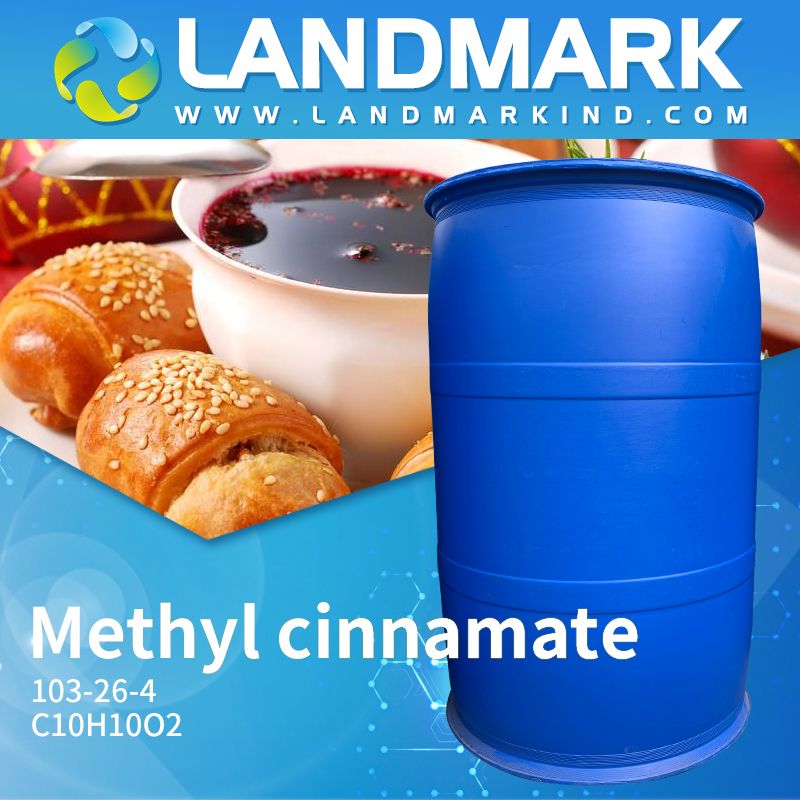Descripción del producto
CAS No.: *******4
Formula: C*0H*0O2
Molecular Weight: **2.*9
Melting point:: ****8 °C(lit.)
Boiling point: **3 °C(lit.)
Density: 1.**2(g/mL,*0/4oC)
Flash point: **3°C
Refractive index : (*0°C)1.***1
Molar volume: (m3/mol)**0.3
Appearance: White to slightly yellow crystal, with cherry and
scent
Solubility: Soluble in ethanol, ether, glycerin, propylene
glycol, most non-volatile oils and mineral oils, insoluble in
water.
Purity:>*9%
Package specification:**0kg/blue barrel
Storage: Pay attention to the source of fire, especially to avoid
sunlight, and store in a cool place.
Usage:
In the international market, it is mainly used in essence, spices
and sunscreen. China's GB*********4 provides for the use of
edible flavors. It is used in the fragrance industry as a
deodorant. It is often used to blend oriental floral fragrances
such as carnations, cherries, strawberries and grapes. It is used
in soaps, detergents, flavors and pastries. Methyl cinnamate and
ethyl cinnamate can be added to cigarette cut tobacco for use as
a flavoring agent and a flavoring compensator. As an organic
synthesis intermediate, it is mainly used in the pharmaceutical
industry.
The medicinal value of methyl cinnamate: methyl imidazole and
methyl cinnamate are used as an intermediate linker to prepare
methyl p-bromomethylcinnamate, which is the main raw material for
the production of ozagrel. Methyl cinnamate has a positive effect
on the inhibition of vitiligo. In whitening and sunscreen, the
effect of methyl cinnamate is obvious.
Methyl cinnamate (C6H5CHCHCOOCH3) is a white crystal with a
melting point of *4 ° C. It is insoluble in water and soluble in
ethanol and ether. Due to its fresh fruit flavor, it is often
used in the perfume industry to formulate fruit flavors, oriental
flavors and soap flavors. Such as high-grade flavor, has a wide
range of uses in food, daily cosmetics, soap, etc. About the
preparation of methyl cinnamate, using polyvinyl pyridine as a
catalyst, so that cinnamic acid and thionyl chloride action into
cinnamoyl chloride, and then Report on the preparation of methyl
cinnamate by reaction with methanol. This method not only has low
yield (yield *7%), many side reactions, complicated operation
steps, corrosion equipment, and tail gas recovery problems, but
also causes environmental pollution. The synthesis of methyl
cinnamate by ethylene glycol and palladium chloride, polyvinyl
chloride ferric chloride resin and ammonium ferric sulfate
dodecahydrate as catalysts, but these methods are also not
satisfactory. Solid superacid ZrO2/S2O*- The method of catalytic
synthesis of methyl cinnamate has not been reported in the
literature at home and abroad. The authors synthesized methyl
cinnamate with cinnamic acid and methanol under the catalysis of
solid superacid ZrO2/S2O**8. The catalyst is cheap and easy to
obtain and catalyze. High activity, Etching apparatus, recycled
reuse. This method is simple, mild reaction conditions,
environmental friendliness and high yields.
Methyl cinnamate, also known as β-phenyl methacrylate, has a
cocoa flavor and is mainly used in the daily chemical and food
industries. It is a commonly used deodorant or food flavor, and
is also an important organic synthetic raw material. At present,
its synthesis methods include inorganic acid (such as
hydrochloric acid, sulfuric acid) catalyzed esterification,
organic acid catalyzed esterification, heterogeneous catalytic
esterification and high pressure microwave synthesis. The
inorganic acid catalyzed esterification method has many side
reactions, long reaction time, low product yield, serious
equipment corrosion, wastewater generated by post-treatment, etc.
The reaction time of heterogeneous catalytic esterification
method is long, and the product yield is not high (*2%). ~*7%);
organic acid catalyzed esterification method has short reaction
time and high product yield, but high cost; high-pressure
microwave synthesis method can overcome the shortcomings of the
first three methods, but it is difficult to realize industrial
production. In the ***0s, the chemistry laboratory of Princeton
University in the United States found that ultrasound has the
effect of accelerating chemical reactions. In the mid****0s, the
application of ultrasonic in chemistry was rapidly developed.
Ultrasound has been applied to oxidation and reduction reactions
in organic chemistry. , addition reaction, polycondensation
reaction, hydrolysis reaction, etc., almost involve various
fields of organic chemistry, and ultrasonic chemistry is
considered to be green chemistry. As a new form of energy,
ultrasonic wave is used in organic chemical reactions, which not
only makes many reactions that could not be carried out or
difficult to carry out smoothly, but also is much better than
traditional mixing as a convenient, rapid, effective and safe
synthesis technology. , external heating method.
| País: |
China |
| N º de Modelo: |
-
|
| Precio FOB: |
(Negociable)
Obtener el precio más reciente
|
| Lugar de origen: |
- |
| Precio de pedido mínimo: |
- |
| Cantidad de pedido mínimo: |
- |
| Detalle de embalaje: |
- |
| El tiempo de entrega: |
- |
| Capacidad de suministro: |
- |
| Tipo de pago: |
- |
| Grupo de productos : |
- |

